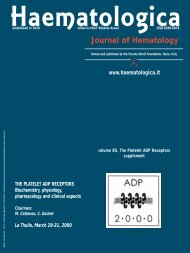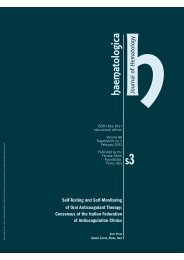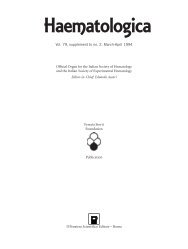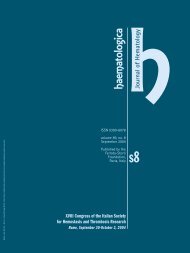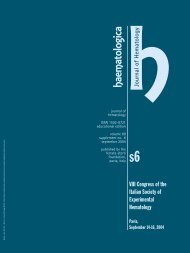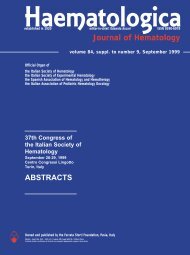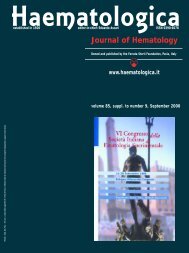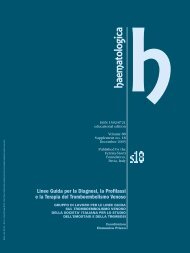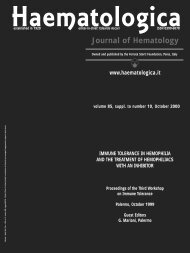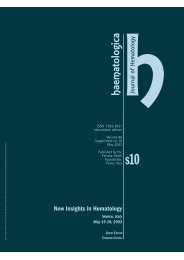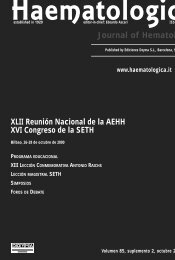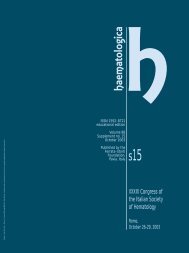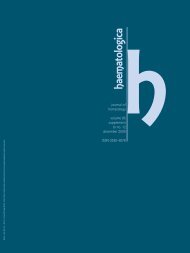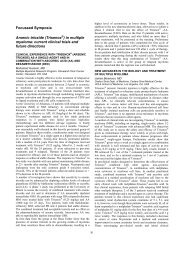[Acquired Inhibitors in Non-Hemophiliacs]review paperImmunological responsivenessof maternal T cells to selfantigens during pregnancy:pregnancy as a model to studyperipheral T cell tolerance andthe role of co-stimulatorymolecules in toleranceinductionhaematologica <strong>2003</strong>; 88(suppl. n. 12):100-105http://www.haematologica.org/free/immunotolerance2001.pdfMELANIE S. VACCHIO, RICHARD J. HODES #Experimental Immunology Branch, National Cancer Institute;#National Institute of Aging, National Institutes of Health,Bethesda, MD, USAHow do maternal T cells respond to encounters withfetal antigens? Many earlier studies have attemptedto characterize changes induced by pregnancy inthe maternal T-cell repertoire of both humans andmice. Interpretation of these results has been difficultsince there has been no way to decipher whetherthe alterations were the result of encountering thefetal antigens or were non-specific changes relatedto pregnancy itself. However, the availability of T-cellreceptor (TCR) transgenic mice allows direct visualizationof the fate of maternal T cells that are reactiveto the fetus and provides a means to probe themechanisms by which maternal T cells respond tothe fetus. We propose that the fetus more closelyresembles self than a true allograft (non-self) in itseffect on the T-cell repertoire, resulting in the inductionof tolerance rather than an immune response.To test this hypothesis, we utilized H-Y-specific TCRtransgenic mice and demonstrate that maternal Tcells specific for fetal antigens decrease in an antigen-specificmanner during pregnancy and remaindepleted postpartum. In addition, the survivingclonotypic T cells have decreased responsiveness tosubsequent antigenic stimulation. Our study demonstratesthat specific recognition of fetal allogeneicantigens by maternal T cells results in toleranceinduction of reactive T cells via mechanisms similarto those seen when mature peripheral T cells aretolerized to self antigens. Interestingly, while ligationof CD28 provides a critical co-stimulatory signalfor activation of T cells, we found that CD28 isalso necessary for tolerance induction of peripheralCD8 T cells. This finding provides a potential focusfor development of tolerance induction therapies.Correspondence: Melanie S. Vacchio, Experimental ImmunologyBranch, National Cancer Institute; National Institutes ofHealth, Bethesda, MD, USA.T-cell recognition of antigenT cells recognize foreign antigen in the form ofpeptide complexed to self major histocompatibility(MHC)-encoded molecules. The specificityof the T-cell receptor (TCR) is generated byrearrangement of discontinuous V, D, and J genesegments resulting in synthesis of TCR α and βchains with unique antigen specificities. Therequirement for TCR binding to self-MHC,together with the random manner in which TCRspecificity is generated, dictates the need forthymic selection to eliminate non-functional orpotentially harmful T cells from the repertoire.Expression of the TCR α and β chains by the thymocyteduring differentiation exposes the thymocyteto a selection process that screens forexpression of TCR with affinity for self MHC. 1-3Thymocytes with appropriate affinity for selfMHC undergo a process called positive selectionthat rescues them from death by neglect, the fateof those thymocytes that either lack functionalTCR expression or fail to express a receptor withsufficient affinity for self-MHC. A proportion ofthymocytes will have a TCR of high affinity for aself MHC/peptide complex, making thempotentially harmful. T cells expressing TCRs withsuch an affinity for self antigens undergo negativeselection within the thymus, a process thatcan be mediated through clonal deletion, 4,5 functionalsilencing or anergy, 6 or by clonal arrest ofthe developing thymocytes. 7 While potent signalingthrough the TCR can initiate toleranceinduction, the mechanism of tolerance canpotentially be influenced by the type of antigenpresentingcell (APC) or the differentiation stageat which antigen is encountered.Ideally, elimination of all autoreactive T cellswould occur in the thymus resulting in a pool ofmature T cells reactive against only foreign proteinantigens. As the thymic cortex is relativelyinaccessible to systemically circulating proteins, 8thymocytes may not encounter, or be tolerizedto, many self proteins not expressed directly inthe thymus. An additional complication is thefact that most T-cell differentiation occurs dur-haematologica vol. 88(supplement n. 12):september <strong>2003</strong>
IV International Workshop on Immune Tolerance in Hemophilia 101Figure 1. T-cell recognition of antigens and co-stimulatorypathways.ing the fetal/neonatal period when certain developmentally-expressedself antigens are not yetpresent. Since thymic tolerance is ultimatelydependent on the array of proteins present in thethymus during the brief period of time that anyone thymocyte may reside there, mature T cellsmay not encounter developmentally expressedproteins until significantly later, in the peripheralimmune system when the proteins areexpressed during puberty, pregnancy, lactationor aging. Situations such as these result in thedistinct possibility that a mature T cell can leavethe thymus and at some point, encounter aperipheral self antigen with which its TCR willbind with sufficient avidity to cause activationand the potential for an autoreactive response.For this reason, extensive research has focusedon understanding if and how peripheral self-toleranceoccurs, not only to understand how thesemechanisms may go awry and result in autoimmunity,but also to identify potential manipulationsthat could be used to induce long-term toleranceto tissue transplants. The mechanisms ofperipheral T-cell tolerance have proven to be varied,and include clonal deletion, immune deviation(alteration of cytokine production andtherefore function), generation of regulatorycells, and functional unresponsiveness (includingTCR or co-receptor downregulation, orinduction of anergy). 2 In turn, many factors havebeen proposed to account for the reason a particularmechanism of tolerance occurs, includingaffinity of the MHC/TCR interaction, type ofAPC, environment in which the antigen isencountered (e.g. presence of cytokines orsteroids), and the concentration and duration ofexposure to an antigen. The impact of these factorson determining the mechanism of self toleranceremains to be elucidated.While the antigen specificity of T cells is determinedby the TCR αβ heterodimer, control of aT cell’s ability to become activated is regulated bya requirement for additional signals such as thoseprovided by cell-surface co-stimulatory molecules.One of the most important of these in theregulatory control of CD4 T cells is the highlystudied CD28/CTLA-4/B7 co-stimulatory pathway.T cells express cell surface CD28 that interactswith its ligands B7.1 or B7.2, which areexpressed primarily on antigen-presenting cells(APCs) such as macrophages, B cells and dendriticcells (Figure 1). 9 In vitro, TCR activation(signal one) in the absence of CD28 (signal two)has been shown to induce anergy, a state of unresponsivenessto subsequent encounters withantigen, 10,11 whereas TCR signaling in conjunctionwith costimulatory CD28 augments T-cellactivation by upregulating mechanisms thatenhance survival (bcl-2) and proliferation (IL-2production). 12-14The fetus: “self” or “non-self”?Pregnancy presents a situation in which maternalT cells have the potential to encounter antigensof fetal origin for which they may be specificbut which they have not encountered duringthymic differentiation and therefore to whichthey would not be tolerized. Mice and humansshare a similar means of placentation known ashemochorial, in which the maternal blood circulatesthrough the placenta in direct contactwith fetally-derived trophoblasts that wouldexpress allogeneic antigens. The giant cells on theouter region of the placenta directly abut thematernal decidua, the specialized region of theuterus surrounding the fetus, whereas thelabyrinthine trophoblasts act as the physicalinterface between maternal and fetal circulations.Forty years ago, Medawar attempted toexplain the mother’s lack of rejection of the fetusby arguing that the fetus may be antigenicallyimmature. 15 While this is clearly not the case, onemight still view the placenta as maintaining thefetus as antigenically separate. Indeed, separationof the maternal and fetal circulation via the placentaprevents access of maternal lymphocytesto the wealth of allogeneic antigens expressed inthe fetus itself. In addition, unlike the fetus, thereis no expression of MHC class II and tightly regulatedexpression of class I in the mouse placenta.In the mouse, polymorphic class I molecules,H-2 K, D and L, are expressed on trophoblaststhat can be found in contact with the maternaldecidua but are noticeably absent on thelabyrinthine trophoblasts. 16 The presence of limitedamounts of MHC class I on the placenta andthe notable absence of class II minimizes the possibilityof antigenic priming of CD4 T cells to thefetus and the likelihood of maternal attack.How might maternal T cells encounter fetalantigens? Virgin T cells do not circulate butrather are found predominantly in the spleenand lymph nodes where initial encounters withantigen occur. However, trophoblasts have beenshown to escape into the maternal blood at a ratethat has been estimated to be as high as 10 5cells/day in humans, 17,18 although detection offetally-derived male cells into maternal lymphoidorgans during gestation in mice has proven moredifficult. 19 Furthermore, human trophoblast cellshaematologica vol. 88(supplement n. 12):september <strong>2003</strong>



